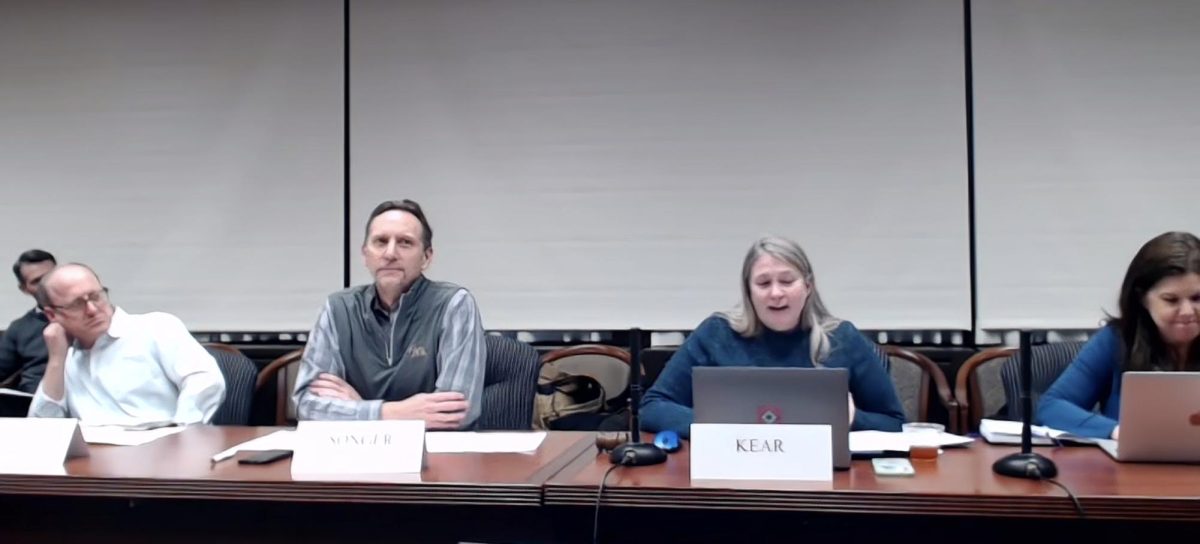Faculty Assembly President Robin Kear said Pitt has seen a 31% increase in the use of testing services since fall 2022 and an overall 250% increase in Disability Resources and Services accommodations since 2000.
“The abilities of schools, departments and individual faculty to meet these testing needs varies widely,” Kear said. “The need for institutional support for a testing center will not ever completely go away. So I think we need to give thought to supporting more resources for the testing center and examine … potential solutions for the short and long term.”
The Faculty Assembly held its first meeting of the spring semester Wednesday afternoon in room 2700 Posvar Hall and over Zoom. During the meeting, Kear discussed classroom accommodation requests, a new minimum salary for postdoctoral scholars and associates and a policy that acknowledges faculty work in diversity, equity and inclusion and community-engaged scholarship.
Kear relayed a memo Interim Provost Joe McCarthy sent in October of 2023 that outlines a policy that “formally acknowledges” DEI and CES work in tenure and promotion processes.
“I feel this is a huge step forward for Pitt and it should be recognized as such,” Kear said. “This is not yet common, so we are doing something that is not yet common everywhere. I think we need to be recognized for that too.”
In an effort to assist students, President Kear announced a new minimum salary for postdoctoral scholars and postdoctoral associates, outlined in a memo sent by Provost McCarthy. Kear noted that this policy will not properly take effect until July 2025. However, it is “strongly recommended that units implement the new minimum” in July 2024.
“This is how we’re remaining competitive and attractive for postdocs,” Kear said.
Kear said there is still “great concern” about phishing email attacks, which the Faculty Assembly discussed during their December meeting.
“I’ve been in discussion over other alternatives, but those are hard to find,” Kear said. “Email forwarding and other fixes will be implemented first with alumni email accounts, so we will hear the results of that.”
The assembly approved two outstanding policies — the Access to and Use of University Computing Resources Policy and the CS 29 Vaccinations and Immunizations Requirements. Assembly member Angela Zack, the computing and information technology chair, presented revisions to the Computing Resource Policy.
“This is an update of existing policy,” Zack said. “The revisions include updates concerning fair and equitable use of resources, privacy language and the responsibility of users in the university with respect to use.”
The assembly voted 97% in favor of the revisions, moving the policy to Senate Council for another vote. Tom Songer, co-chair of Faculty Affairs, then presented Policy CS 29, and said it “represents a consolidation of multiple policies and procedures that existed at the University before the pandemic.”
“The goal in this policy was to bring all of those disparate areas that judged infectious disease issues into one policy,” Songer said.
Students currently need measles, mumps, rubella and chickenpox vaccines, with an additional meningitis vaccine if living in dormitories. The revisions to the CS 29 policy, which previously mandated COVID-19 vaccinations, includes a “change in outline,” making vaccine requirements, including the prior COVID-19 immunization dismissal, “more detail[ed] and more transparent.”
“[The new policy] provides flexibility for the university,” assembly member Tom Hinder said. “The Department of Environmental Health and Safety, or other entity charged by the chancellor in consultation with Student Health, may oppose additional vaccination requirements for students if it determines that such protection is needed for that population.”
The Assembly voted 91% in favor of the policy. The meeting ended with a discussion of the great efforts behind forming the LGBTQIA+ Steering Committee, led by co-chairs Todd Reeser and Angela Bedford-Jack.
“The goal of creating this committee is to share, report, learn and assess the enterprise-wide efforts to improve the climate and culture for the University for LGBTQ committee communities and acknowledge that a committee does not just solve that,” Bedford-Jack said. “But we also know that we have to begin to do something to address the issues.”
Bedford-Jack communicated support from both Vice Chancellor Clyde Wilson Pickett and Chancellor Joan Gabel, demonstrated by initial funding that will advance work and programming. Both Bedford-Jack and Reeser emphasized that they are “trying to be really thoughtful” about who is on the committee to “strategically move things forward.”
“We’re trying to put together an intersectional group of folks,” Resider said. “So intersectional both in the gender studies sense of the word, with respect to race, ethnicity, gender, sexuality and so on; but also intersectional with respect to the role that folks play at the University of Pittsburgh. So undergraduates, graduates, faculty, staff, alums — it’s also been suggested that we think about community members as well, people that aren’t at Pitt.”


